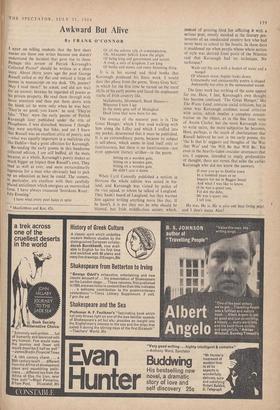Awkward But Alive
By FRANK O'CONNOR
I KEEP on telling students that the best short stories are those one writes because one doesn't understand the incident that gave rise to them. Perhaps this review of Patrick Kavanagh's Collected Poems* should be written as a short story. About thirty years ago the poet George Russell called at my flat and noticed a heap of poems in manuscript on my desk. 'Oh, poems? May I read them?' he asked, and did not wait for an answer, because he regarded all poems as his private property. He read them through with fierce attention and then put them down with the blank air he wore only when he was hurt. 'They're no good, you know,' he said. 'They're fake.' They' were the early poems of Patrick Kavanagh later published under the title of Ploughman. I was disturbed, because I thought they were anything but fake, and yet I knew that Russell was an excellent critic of poetry, and --what was equally important in a malicious city like Dublin—had a great affection for Kavanagh.
Re-reading the early poems in this handsome collected edition, I am still baffled, all the more because, as a whole, Kavanagh's poetry makes so much bigger an impact than Russell's own. They read as well as ever, and seem extraordinarily ingenious for a man who obviously had to pick uP an education as best he could. The sonnets, in particular, are excellent with their carefully Placed anticlimax which energises an overworked form. I have always treasured 'Inniskeen Road: July Evening.'
I have what every poet hates in spite
* MacGibbon and Kee, 42s.
Of all the solemn talk of contemplation. Oh, Alexander Selkirk knew the plight Of being king and government and nation. A road, a mile of kingdom, I am king Of banks and stones and every blooming thing. It is in his second and third books that Kavanagh produced his finest work. I would date this phase from the poem, 'Stony Grey Soil,' in which for the first time he turned on the rural idylls of his early poems and faced the unpleasant truths of Irish country life. Mullahinsha, D-rummeril, Black Shanco- Wherever I turn I see In the stony grey soil of Monaghan Dead loves that were born for me.
The essence of the maturer poet is in 'The Great Hunger,' which I first read walking with him along the Liffey and which I stuffed into my pocket, determined that it must be published. It is an extraordinary poem, because its subject is self-abuse, which seems to lend itself only to facetiousness, but there is no facetiousness—not even apparent literary artifice—in the poem. Sitting on a wooden gate, Sitting on a wooden gate, Sitting on a wooden gate He didn't care a damn. . . .
When Cyril Connolly published a section in Horizon the whole edition was seized in Ire- land, and Kavanagh was visited by police of the vice squad, to whom he talked of Langland. They hadn't heard of Langland, but they warned him against writing anything more like that. If he hasn't, it is not they nor he who should be blamed, but Irish middle-class society which,
instead of praising God for afflicting it with a serious poet, merely mocked at the literary pre- tensions of an uneducated country boy who had never been to school to the Jesuits. In those days it maddened me when people whose whole notion of style was derived from poets of the Nineties said that Kavanagh had no technique. No technique? Wash out the cart with a bucket of water and a wangel Of wheaten straw. Jupiter looks down. Unlearnedly and unreasonably poetry is shaped Awkwardly but alive in the unmeasured womb.
The later work has nothing of the same appeal for me. Here, I feel, Kavanagh's own thought has become confused. 'The Great Hunger,' like The Waste Land, contains social criticism, but in some way Kavanagh confuses social criticism with satire, which implies a complete concen- tration on the object, as in the fine later verse of Austin Clarke; but the more Kavanagh tries to write satire, the more subjective he becomes. Here, perhaps, is the touch of charlatanism that Russell believed he saw in the early poems, for 'the Is that Is' suggests sad thoughts of 'the Was that Was' and 'the Will Be that Will Be.' Yet even in the heavily-laden oracular utterances that are, I suppose, intended to imply profundities of thought, there are verses that echo the earlier Kavanagh who did not know the answers.
If ever you go to Dublin town In a hundred years or so Inquire for me in Baggot Street And what I was like to know. 0 he was a queer one, Fol dol the dido, He was a queer one I tell you. He was. He is. He is also our best living poet, and I don't mean Alas!






























 Previous page
Previous page